
Blaise Pascal
Early work of Blaise Pascal of France included the invention of the adding machine and syringe and the co-development with Pierre de Fermat of the mathematical theory of probability; later, he, a Jansenist, wrote on philosophy and theology, notably as collected in the posthumous Pensées (1670).
This contemporary of René Descartes attained ten years of age in 1633, when people forced Galileo Galilei to recant his belief that Earth circled the Sun. He lived in Paris at the same time, when Thomas Hobbes in 1640 published his famous Leviathan (1651). Together, Pascal created the calculus.
A near-fatal carriage accident in November 1654 persuaded him to turn his intellect finally toward religion. The story goes that on the proverbial dark
If you like author Blaise Pascal here is the list of authors you may also like
Buy books on AmazonBlaise Pascal similar authors
-
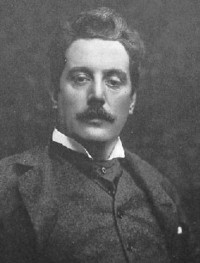
Giacomo Puccini
An Italian composer, son of Michele Puccini and fifth in a line of composers from Lucca. After studying music with his uncle, Fortunato Magi, and with the director of the Insituto Musicale Pacini, Carlo Angeloni, he started his career at the age of fourteen as an organist of St. Martino and St. Michele, Lucca, and at other local churches. However, a performance of Verdi's Aida at Pisa in 1876 made such an impression on him he decided to become an opera composer. With a scholarship and financial support from an uncle, he was able to enter the Milan Conservatory in 1880. During his three years there, his chief teachers were Bazzini and Ponchielli.
Buy books on Amazon
Punccini's best known operas are: Le villi (1884), Edgar (1889), Manon Lescaut (1893), La Boheme -

Voltaire
Complete works (1880) : https://archive.org/details/oeuvresco...
Buy books on Amazon
In 1694, Age of Enlightenment leader Francois-Marie Arouet, known as Voltaire, was born in Paris. Jesuit-educated, he began writing clever verses by the age of 12. He launched a lifelong, successful playwriting career in 1718, interrupted by imprisonment in the Bastille. Upon a second imprisonment, in which Francois adopted the pen name Voltaire, he was released after agreeing to move to London. There he wrote Lettres philosophiques (1733), which galvanized French reform. The book also satirized the religious teachings of Rene Descartes and Blaise Pascal, including Pascal's famed "wager" on God. Voltaire wrote: "The interest I have in believing a thing is not a proof of the exi -

Plato
Plato (Greek: Πλάτων), born Aristocles (c. 427 – 348 BC), was an ancient Greek philosopher of the Classical period who is considered a foundational thinker in Western philosophy and an innovator of the written dialogue and dialectic forms. He raised problems for what became all the major areas of both theoretical philosophy and practical philosophy, and was the founder of the Platonic Academy, a philosophical school in Athens where Plato taught the doctrines that would later become known as Platonism.
Buy books on Amazon
Plato's most famous contribution is the theory of forms (or ideas), which has been interpreted as advancing a solution to what is now known as the problem of universals. He was decisively influenced by the pre-Socratic thinkers Pythagoras, H -

William Shakespeare
William Shakespeare was an English playwright, poet, and actor. He is widely regarded as the greatest writer in the English language and the world's pre-eminent dramatist. He is often called England's national poet and the "Bard of Avon" (or simply "the Bard"). His extant works, including collaborations, consist of some 39 plays, 154 sonnets, three long narrative poems, and a few other verses, some of uncertain authorship. His plays have been translated into every major living language and are performed more often than those of any other playwright. Shakespeare remains arguably the most influential writer in the English language, and his works continue to be studied and reinterpreted.
Buy books on Amazon
Shakespeare was born and raised in Stratford-upon-Avon, W -

Friedrich Nietzsche
Friedrich Wilhelm Nietzsche was a German classical scholar, philosopher, and critic of culture, who became one of the most influential of all modern thinkers. He began his career as a classical philologist before turning to philosophy. He became the youngest person to hold the Chair of Classical Philology at the University of Basel in 1869 at the age of 24, but resigned in 1879 due to health problems that plagued him most of his life; he completed much of his core writing in the following decade. In 1889, at age 44, he suffered a collapse and afterward a complete loss of his mental faculties, with paralysis and probably vascular dementia. He lived his remaining years in the care of his mother until her death in 1897 and then with his sister
Buy books on Amazon -

William Faulkner
William Cuthbert Faulkner was an American writer. He is best known for his novels and short stories set in the fictional Yoknapatawpha County, Mississippi, a stand-in for Lafayette County where he spent most of his life. A Nobel laureate, Faulkner is one of the most celebrated writers of American literature and often is considered the greatest writer of Southern literature.
Buy books on Amazon
Faulkner was born in New Albany, Mississippi, and raised in Oxford, Mississippi. During World War I, he joined the Royal Canadian Air Force, but did not serve in combat. Returning to Oxford, he attended the University of Mississippi for three semesters before dropping out. He moved to New Orleans, where he wrote his first novel Soldiers' Pay (1925). He went back to Oxford -

William Makepeace Thackeray
William Makepeace Thackeray was an English novelist, satirist, and journalist, best known for his keen social commentary and his novel Vanity Fair (1847–1848). His works often explored themes of ambition, hypocrisy, and the moral failings of British society, making him one of the most significant literary figures of the Victorian era.
Buy books on Amazon
Born in Calcutta, British India, he was sent to England for his education after his father’s death. He attended Charterhouse School, where he developed a distaste for the rigid school system, and later enrolled at Trinity College, Cambridge. However, he left without earning a degree, instead traveling in Europe and pursuing artistic ambitions.
After losing much of his inheritance due to bad investments, Thackera -

Søren Kierkegaard
Søren Aabye Kierkegaard was a prolific 19th century Danish philosopher and theologian. Kierkegaard strongly criticised both the Hegelianism of his time and what he saw as the empty formalities of the Church of Denmark. Much of his work deals with religious themes such as faith in God, the institution of the Christian Church, Christian ethics and theology, and the emotions and feelings of individuals when faced with life choices. His early work was written under various pseudonyms who present their own distinctive viewpoints in a complex dialogue.
Buy books on Amazon
Kierkegaard left the task of discovering the meaning of his works to the reader, because "the task must be made difficult, for only the difficult inspires the noble-hearted". Scholars have interpret -

Karl Marx
With the help of Friedrich Engels, German philosopher and revolutionary Karl Marx wrote The Communist Manifesto (1848) and Das Kapital (1867-1894), works, which explain historical development in terms of the interaction of contradictory economic forces, form many regimes, and profoundly influenced the social sciences.
Buy books on Amazon
German social theorist Friedrich Engels collaborated with Karl Marx on The Communist Manifesto in 1848 and on numerous other works.
Mikhail Mikhailovich Bakhtin in London opposed Communism of Karl Marx with his antithetical anarchy.
Works of Jacques Martin Barzun include Darwin, Marx, Wagner (1941).
The Prussian kingdom introduced a prohibition on Jews, practicing law; in response, a man converted to Protestantism -

Ludwig Wittgenstein
Ludwig Josef Johann Wittgenstein (Ph.D., Trinity College, Cambridge University, 1929) was an Austrian-British philosopher who worked primarily in logic, the philosophy of mathematics, the philosophy of mind, and the philosophy of language.
Buy books on Amazon
Described by Bertrand Russell as "the most perfect example I have ever known of genius as traditionally conceived, passionate, profound, intense, and dominating", he helped inspire two of the twentieth century's principal philosophical movements: the Vienna Circle and Oxford ordinary language philosophy. According to an end of the century poll, professional philosophers in Canada and the U.S. rank both his Tractatus Logico-Philosophicus and Philosophical Investigations among the top five most important boo -

Jonathan Barnes
Jonathan Barnes, FBA (born 26 December 1942 in Wenlock, Shropshire) is an English scholar of ancient philosophy.
Buy books on Amazon
Librarian Note: There is more than one author in the GoodReads database with this name.
See also Jonathan Barnes or Jonathan Barnes -

Thomas Hobbes
Thomas Hobbes was a British philosopher and a seminal thinker of modern political philosophy. His ideas were marked by a mechanistic materialist foundation, a characterization of human nature based on greed and fear of death, and support for an absolute monarchical form of government. His 1651 book Leviathan established the foundation for most of Western political philosophy from the perspective of social contract theory.
Buy books on Amazon
He was also a scholar of classical Greek history and literature, and produced English translation of Illiad, Odyssey and History of Peloponnesian War. -

Jean Racine
Classical Greek and Roman themes base noted tragedies, such as Britannicus (1669) and Phèdre (1677), of French playwright Jean Baptiste Racine.
Buy books on Amazon
Adherents of movement of Cornelis Jansen included Jean Baptiste Racine.
This dramatist ranks alongside Molière (Jean Baptiste Poquelin) and Pierre Corneille of the "big three" of 17th century and of the most important literary figures in the western tradition. Psychological insight, the prevailing passion of characters, and the nakedness of both plot and stage mark dramaturgy of Racine. Although primarily a tragedian, Racine wrote one comedy.
Orphaned by the age of four years when his mother died in 1641 and his father died in 1643, he came into the care of his grandparents. At the death of -

Knut Hamsun
Novels of Norwegian writer Knut Hamsun (born Knud Pedersen), include Hunger (1890) and The Growth of the Soil (1917). He won the Nobel Prize for literature in 1920.
Buy books on Amazon
He insisted on the intricacies of the human mind as the main object of modern literature to describe the "whisper of the blood, and the pleading of the bone marrow." Hamsun pursued his literary program, debuting in 1890 with the psychological novel Hunger. -

Molière
Sophisticated comedies of French playwright Molière, pen name of Jean Baptiste Poquelin, include Tartuffe (1664), The Misanthrope (1666), and The Bourgeois Gentleman (1670).
Buy books on Amazon
French literary figures, including Molière and Jean de la Fontaine, gathered at Auteuil, a favorite place.
People know and consider Molière, stage of Jean-Baptiste Poquelin, also an actor of the greatest masters in western literature. People best know l'Ecole des femmes (The School for Wives), l'Avare ou l'École du mensonge (The Miser), and le Malade imaginaire (The Imaginary Invalid) among dramas of Molière.
From a prosperous family, Molière studied at the Jesuit Clermont college (now lycée Louis-le-Grand) and well suited to begin a life in the -

René Descartes
Meditations on First Philosophy (1641) and Principles of Philosophy (1644), main works of French mathematician and scientist René Descartes, considered the father of analytic geometry and the founder of modern rationalism, include the famous dictum "I think, therefore I am."
Buy books on Amazon
A set of two perpendicular lines in a plane or three in space intersect at an origin in Cartesian coordinate system. Cartesian coordinate, a member of the set of numbers, distances, locates a point in this system. Cartesian coordinates describe all points of a Cartesian plane.
From given sets, {X} and {Y}, one can construct Cartesian product, a set of all pairs of elements (x, y), such that x belongs to {X} and y belongs to {Y}.
Cartesian philosophers include An -

David Hume
David Hume was a Scottish historian, philosopher, economist, diplomat and essayist known today especially for his radical philosophical empiricism and scepticism.
Buy books on Amazon
In light of Hume's central role in the Scottish Enlightenment, and in the history of Western philosophy, Bryan Magee judged him as a philosopher "widely regarded as the greatest who has ever written in the English language." While Hume failed in his attempts to start a university career, he took part in various diplomatic and military missions of the time. He wrote The History of England which became a bestseller, and it became the standard history of England in its day.
His empirical approach places him with John Locke, George Berkeley, and a handful of others at the time as a Brit -

John Locke
Librarian Note: There is more than one author in the GoodReads database with this name.
Buy books on Amazon
John Locke was an English philosopher. He is considered the first of the British Empiricists, but is equally important to social contract theory. His ideas had enormous influence on the development of epistemology and political philosophy, and he is widely regarded as one of the most influential Enlightenment thinkers and contributors to liberal theory. His writings influenced Voltaire and Rousseau, many Scottish Enlightenment thinkers, as well as the American revolutionaries. This influence is reflected in the American Declaration of Independence.
Locke's theory of mind is often cited as the origin for modern conceptions of identity and "the self", figur -

Baruch Spinoza
Controversial pantheistic doctrine of Dutch philosopher and theologian Baruch Spinoza or Benedict advocated an intellectual love of God; people best know Ethics , his work of 1677.
Buy books on Amazon
People came considered this great rationalist of 17th century.
In his posthumous magnum opus, he opposed mind–body dualism of René Descartes and earned recognition of most important thinkers of west. This last indisputable Latin masterpiece, which Spinoza wrote, finally turns and entirely destroys the refined medieval conceptions.
After death of Baruch Spinoza, often Benedictus de Spinoza, people realized not fully his breadth and importance until many years. He laid the ground for the 18th-century Enlightenment and modern Biblical criticism, including concept -

Ivan Turgenev
Ivan Sergeyevich Turgenev (Cyrillic: Иван Сергеевич Тургенев) was a novelist, poet, and dramatist, and now ranks as one of the towering figures of Russian literature. His major works include the short-story collection A Sportsman’s Sketches (1852) and the novels Rudin (1856), Home of the Gentry (1859), On the Eve (1860), and Fathers and Sons (1862).
Buy books on Amazon
These works offer realistic, affectionate portrayals of the Russian peasantry and penetrating studies of the Russian intelligentsia who were attempting to move the country into a new age. His masterpiece, Fathers and Sons, is considered one of the greatest novels of the nineteenth century.
Turgenev was a contemporary with Fyodor Dostoevsky and Leo Tolstoy. While these wrote about church and reli -

Pierre Corneille
Pierre Corneille était l'un des trois grands dramaturges français du XVIIe siècle , avec Molière et Racine. Il a été appelé «le fondateur de la tragédie française» et était productive pendant près de quarante ans.
Buy books on Amazon
Vous pouvez lire son oeuvre sur:
- http://www.poesies.net/corneille.html
- http://gallica.bnf.fr/Search?ArianeWi...
Pierre Corneille was one of the three great seventeenth-century French dramatists, along with Molière and Racine. He has been called "the founder of French tragedy" and produced plays for nearly forty years.
You can read his works (in French) on:
- http://www.poesies.net/corneille.html
- http://gallica.bnf.fr/Search?ArianeWi... -

Boethius
Roman mathematician Anicius Manlius Severinus Boethius, imprisoned on charges of treason, wrote The Consolation of Philosophy , his greatest work, an investigation of destiny and free will, while awaiting his execution.
Buy books on Amazon
His ancient and prominent noble family of Anicia included many consuls and Petronius Maximus and Olybrius, emperors. After Odoacer deposed the last western emperor, Flavius Manlius Boethius, his father, served as consul in 487.
Boethius entered public life at a young age and served already as a senator before the age of 25 years in 504. Boethius served as consul in 510 in the kingdom of the Ostrogoths.
In 522, Boethius saw his two sons serve as consuls. Theodoric the Great, king, suspected Boethius of conspiring with the -

François de La Rochefoucauld
Librarian Note: There is more than one author in the Goodreads database with this name. This profile may contain books from multiple authors of this name.
Buy books on Amazon
Other authors publishing under this name are:
François de la Rochefoucauld
François VI, duc de la Rochefoucauld, prince de Marcillac (French: [fʁɑ̃swa d(ə) la ʁɔʃfuko]; 15 September 1613 – 17 March 1680) was a noted French author of maxims and memoirs. It is said that his world-view was clear-eyed and urbane, and that he neither condemned human conduct nor sentimentally celebrated it. Born in Paris on the Rue des Petits Champs, at a time when the royal court was vacillating between aiding the nobility and threatening it, he was considered an exemplar of the accomplished 17th-century noblema -

Walter Ralston Martin
Walter R. Martin was an American Evangelical minister, author, and Christian apologist who founded the Christian Research Institute in 1960 as a para-church ministry specializing as a clearing-house of information in both general Christian apologetics and in countercult apologetics.
Buy books on Amazon -

Joris-Karl Huysmans
Charles Marie Georges Huysmans was a French novelist who published his works as Joris-Karl Huysmans. AKA: J.-K. Huysmans.
Buy books on Amazon
He is most famous for the novel À rebours (Against Nature). His style is remarkable for its idiosyncratic use of the French language, wide-ranging vocabulary, wealth of detailed and sensuous description, and biting, satirical wit.
The novels are also noteworthy for their encyclopedic documentation, ranging from the catalogue of decadent Latin authors in À rebours to the discussion of the symbiology of Christian architecture in La cathédrale. Huysmans' work expresses a disgust with modern life and a deep pessimism, which led the author first to the philosophy of Arthur Schopenhauer then to the teachings of the Catholic Chu -

Ludwig Wittgenstein
Ludwig Josef Johann Wittgenstein (Ph.D., Trinity College, Cambridge University, 1929) was an Austrian-British philosopher who worked primarily in logic, the philosophy of mathematics, the philosophy of mind, and the philosophy of language.
Buy books on Amazon
Described by Bertrand Russell as "the most perfect example I have ever known of genius as traditionally conceived, passionate, profound, intense, and dominating", he helped inspire two of the twentieth century's principal philosophical movements: the Vienna Circle and Oxford ordinary language philosophy. According to an end of the century poll, professional philosophers in Canada and the U.S. rank both his Tractatus Logico-Philosophicus and Philosophical Investigations among the top five most important boo -

Dale C. Allison Jr.
Dr. Dale C. Allison Jr., an Errett M. Grable professor of New Testament exegesis and early Christianity, has been on the faculty of Pittsburgh Theological Seminary since 1997. Before then he served on the faculties of Texas Christian University (Fort Worth, Texas) and Friends University (Wichita, Kan.).
Buy books on Amazon
His areas of expertise include Second Temple Judaism, and he is the author of books on early Christian eschatology, the Gospel of Matthew, the so-called Sayings Source or Q, and the historical Jesus.
He has also written The Luminous Dusk, a book on religious experience in the modern world, and a full-length commentary on the Testament of Abraham. His most recently published works are The Love There That’s Sleeping: The Art and Spirituality of -

Irenaeus of Lyons
St. Irenaeus (2nd cenutry C.E. – c. 202) was Bishop of Lugdunum in Gaul, then a part of the Roman Empire (now Lyon, France). He was an early church father and apologist, and his writings were formative in the early development of Christian theology. Irenaeus' best-known book, Adversus Haereses or Against Heresies (c. 180) is a detailed attack on Gnosticism, which was then a serious threat to the Church, and especially on the system of the Gnostic Valentinus.
Buy books on Amazon -

Martin Luther
Martin Luther (1483-1546) was a German monk, theologian, university professor and church reformer whose ideas inspired the Protestant Reformation and changed the course of Western civilization.
Buy books on Amazon
Luther's theology challenged the authority of the papacy by holding that the Bible is the only infallible source of religious authority and that all baptized Christians under Jesus are a spiritual priesthood. According to Luther, salvation was a free gift of God, received only by true repentance and faith in Jesus as the Messiah, a faith given by God and unmediated by the church.
Luther's confrontation with Charles V at the Diet of Worms over freedom of conscience in 1521 and his refusal to submit to the authority of the Emperor resulted in his being d -

William Godwin
William Godwin was the son and grandson of strait-laced Calvinist ministers. Strictly-raised, he followed in paternal footsteps, becoming a minister by age 22. His reading of atheist d'Holbach and others caused him to lose both his belief in the doctrine of eternal damnation, and his ministerial position. Through further reading, Godwin gradually became godless. He promoted anarchism (but not anarchy). His Political Justice and The Enquirer (1793) argued for morality without religion, causing a scandal. He followed that philosophical book with a trail-blazing fictional adventure-detective story, Caleb Williams (1794), to introduce readers to his ideas in a popular format. Godwin, a leading thinker and author ranking in his day close to Thom
Buy books on Amazon -

Hugh Bowden
Hugh Bowden (DPhil, Ancient History, University of Oxford, 1990) is Professor of Ancient History and former head of arts in the Faculty of Arts and Humanities at King's College, London.
Buy books on Amazon -

Arthur Koestler
Darkness at Noon (1940), novel of Hungarian-born British writer Arthur Koestler, portrays his disillusionment with Communism; his nonfiction works include The Sleepwalkers (1959) and The Ghost in the Machine (1967).
Buy books on Amazon
Arthur Koestler CBE [*Kösztler Artúr] was a prolific writer of essays, novels and autobiographies.
He was born into a Hungarian Jewish family in Budapest but, apart from his early school years, was educated in Austria. His early career was in journalism. In 1931 he joined the Communist Party of Germany but, disillusioned, he resigned from it in 1938 and in 1940 published a devastating anti-Communist novel, Darkness at Noon, which propelled him to instant international fame.
Over the next forty-three years he espoused ma -
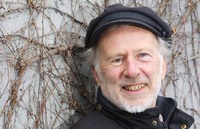
R. Murray Schafer
Raymond Murray Schafer (1933-2021) was a Canadian composer, writer, music educator, and environmentalist perhaps best known for his World Soundscape Project, concern for acoustic ecology, and his book The Tuning of the World (1977). He was the first recipient of the Jules Léger Prize in 1978.
Buy books on Amazon -

Jacob Burckhardt
Carl Jacob Christoph Burckhardt was a historian of art and culture, and an influential figure in the historiography of each field. He is known as one of the major progenitors of cultural history, albeit in a form very different from how cultural history is conceived and studied in academia today. Siegfried Giedion described Burckhardt's achievement in the following terms: "The great discoverer of the age of the Renaissance, he first showed how a period should be treated in its entirety, with regard not only for its painting, sculpture and architecture, but for the social institutions of its daily life as well." Burckhardt's best known work is The Civilization of the Renaissance in Italy (1860).
Buy books on Amazon -

Richard Wagner
Germanic legends often based romantic operas of especially known composer Richard Wagner, who worked Tannhäuser (1845) and the tetralogy Der Ring des Nibelungen (1853-1876).
Buy books on Amazon
From 1872, Richard Wagner lived at Bayreuth to 1883 and designed the opera house, used chiefly for performances of his works.
Works of Jacques Martin Barzun include Darwin, Marx, Wagner (1941).
Wilhelm Richard Wagner conducted, directed theater, and authored essays, primarily for his later called "music dramas." Unlike most other greats, Wagner wrote the scenario and libretto.
https://en.wikipedia.org/wiki/Richard... -
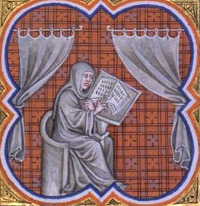
Einhard
Historian, born c. 770 in the district of the River Main in the eastern part of the Frankish Empire; d. 14 March, 840, at Seligenstadt. His earliest training he received at the monastery of Fulda, where he showed such exceptional promise that Abbot Baugulf sent him to the court of Charlemagne. His education was completed at the Palace School, where he was fortunate enough to count among his masters the great Alcuin, who bears witness to his remarkable talents in mathematics and architecture, and also to the fact that he was among the emperor's most trusted advisers. Charlemagne gave Einhard charge of his great public buildings, e.g. the construction of Aachen cathedral and the palaces of Aachen and Ingelheim. Charlemagne also availed himsel
Buy books on Amazon -

Søren Kierkegaard
Søren Aabye Kierkegaard was a prolific 19th century Danish philosopher and theologian. Kierkegaard strongly criticised both the Hegelianism of his time and what he saw as the empty formalities of the Church of Denmark. Much of his work deals with religious themes such as faith in God, the institution of the Christian Church, Christian ethics and theology, and the emotions and feelings of individuals when faced with life choices. His early work was written under various pseudonyms who present their own distinctive viewpoints in a complex dialogue.
Buy books on Amazon
Kierkegaard left the task of discovering the meaning of his works to the reader, because "the task must be made difficult, for only the difficult inspires the noble-hearted". Scholars have interpret -

Carlo Michelstaedter
Carlo Michelstaedter (3 June 1887 - 17 October 1910) was an Italian writer, philosopher, and man of letters.
Buy books on Amazon
Carlo Michelstaedter was born in Gorizia, the capital of the Austro-Hungarian County of Gorizia and Gradisca, as the youngest of four children in a well-to-do Italian-speaking Jewish family. From his father Alberto, the head of an insurance office and president of the Gabinetto di Lettura goriziano, he received a push towards literary study; from his mother Emma Luzzatto, a great love for family and country.
He was a scrappy and introverted boy, but by the end of high school (completed in Gorizia), he developed into a brilliant, athletic, intelligent youth. He enrolled in the department of mathematics in Vienna, but soon moved to Flore -

Edward Feser
Edward Feser is Associate Professor of Philosophy at Pasadena City College in Pasadena, California. He has been a Visiting Assistant Professor at Loyola Marymount University in Los Angeles and a Visiting Scholar at the Social Philosophy and Policy Center at Bowling Green State University in Bowling Green, Ohio. He holds a Ph.D. in philosophy from the University of California at Santa Barbara, an M.A. in religion from the Claremont Graduate School, and a B.A. in philosophy and religious studies from the California State University at Fullerton.
Buy books on Amazon
Called by National Review “one of the best contemporary writers on philosophy,” Feser is the author of On Nozick, Philosophy of Mind, Locke, The Last Superstition: A Refutation of the New Atheism, and -

Comte de Lautréamont
Comte de Lautréamont (French pronunciation: [lotʁeaˈmɔ̃]) was the pseudonym of Isidore Lucien Ducasse, a Uruguayan-born French poet. Little is known about his life and he wished to leave no memoirs. He died at the age of 24 in Paris.
Buy books on Amazon
His only works, Les Chants de Maldoror and Poésies, had a major influence on modern literature, particularly on the Surrealists (similarly to Baudelaire and Rimbaud) and the Situationists. Comte de Lautréamont is one of the poètes maudits and a precursor to Surrealism. -
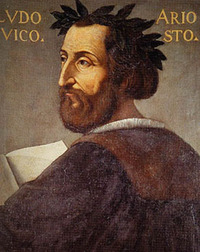
Ludovico Ariosto
Known Italian writer Ludovico Ariosto, or Lodovico Ariosto first published Orlando Furioso his primary epic comic poem, in 1516.
Buy books on Amazon
He best authored the romance. This continuation of Orlando Innamorato of Matteo Maria Boiardo describes the adventures of Charlemagne and the Franks, who battle against the Saracens, with diversions into many side plots. Ariosto composed in the ottava rima scheme and introduced narrator commentary throughout the work.
https://en.wikipedia.org/wiki/Ludovic... -

Norman Russell
Norman Russell is an Orthodox translator and patristic scholar of partial Greek descent. He holds a doctorate from the University of Oxford and is an Honorary Research Fellow of St Stephen’s House of the same university.
Buy books on Amazon -

Joseph Joubert
Librarian Note: There is more than one author in the Goodreads database with this name. This profile may contain books from multiple authors of this name.
Buy books on Amazon
Other authors publishing under this name are:
Joseph Joubert, prêtre catholique et un organiste
Joseph Joubert was a French moralist and essayist, remembered today largely for his Pensées published posthumously.
From the age of 14 Joubert attended a religious college in Toulouse, where he later taught until 1776. In 1778 he went to Paris where he met D'Alembert and Diderot, amongst others, and later became friends with young writer and diplomat Chateaubriand.
He alternated between living in Paris with his friends and life in the privacy of the countryside in Villeneuve-sur-Yonne. He was appoi -
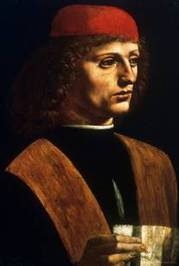
Marsilio Ficino
Marsilio Ficino (Italian: [marˈsiːljo fiˈtʃiːno]; Latin name: Marsilius Ficinus; 19 October 1433 – 1 October 1499) was an Italian scholar and Catholic priest who was one of the most influential humanist philosophers of the early Italian Renaissance. He was also an astrologer, a reviver of Neoplatonism in touch with every major academic thinker and writer of his day and the first translator of Plato's complete extant works into Latin. His Florentine Academy, an attempt to revive Plato's Academy, had enormous influence on the direction and tenor of the Italian Renaissance and the development of European philosophy.
Buy books on Amazon -

George Berkeley
George Berkeley (/ˈbɑːrklɪ/;[1][2] 12 March 1685 – 14 January 1753) — known as Bishop Berkeley (Bishop of Cloyne) — was an Anglo-Irish philosopher whose primary achievement was the advancement of a theory he called "immaterialism" (later referred to as "subjective idealism" by others). This theory denies the existence of material substance and instead contends that familiar objects like tables and chairs are only ideas in the minds of perceivers, and as a result cannot exist without being perceived. Berkeley is also known for his critique of abstraction, an important premise in his argument for immaterialism.
Buy books on Amazon
Librarian note: There is more than one author in the Goodreads database with this name.
George^Berkeley -

Donald Davidson
Donald Davidson was one of the most important philosophers of the latter half of the twentieth century. His ideas, presented in a series of essays from the 1960's onwards, have been influential across a range of areas from semantic theory through to epistemology and ethics. Davidson's work exhibits a breadth of approach, as well as a unitary and systematic character, which is unusual within twentieth century analytic philosophy. Thus, although he acknowledged an important debt to W. V. O. Quine, Davidson's thought amalgamates influences (though these are not always explicit) from a variety of sources, including Quine, C. I. Lewis, Frank Ramsey, Immanuel Kant and the later Wittgenstein. And while often developed separately, Davidson's ideas
Buy books on Amazon -

A.W. Moore
Adrian William Moore (born 1956) is a Professor of Philosophy and Lecturer in Philosophy at the University of Oxford and Tutorial Fellow of St Hugh's College, Oxford.
Buy books on Amazon -

Richard Tuck
Richard Tuck is Professor of Government Department. Professor Tuck is a premier scholar of the history of political thought. His works include Natural Rights Theories (1979), Hobbes (1989), and Philosophy and Government, 1572-1651 (1993). They address a variety of topics including political authority, human rights, natural law, and toleration, and focus on a number of thinkers including Hobbes, Grotius, Selden, and Descartes. His current work deals with political thought and international law, and traces the history of thought about international politics from Grotius, Hobbes, Pufendorf, Locke, and Vattel, to Kant. He is also engaged in a work on the origins of twentieth century economic thought; in it he argues that the 'free rider' proble
Buy books on Amazon -

Karl Jaspers
Jaspers was born in Oldenburg in 1883 to a mother from a local farming community, and a jurist father. He showed an early interest in philosophy, but his father's experience with the legal system undoubtedly influenced his decision to study law at university. It soon became clear that Jaspers did not particularly enjoy law, and he switched to studying medicine in 1902.
Buy books on Amazon
Jaspers graduated from medical school in 1909 and began work at a psychiatric hospital in Heidelberg where Emil Kraepelin had worked some years earlier. Jaspers became dissatisfied with the way the medical community of the time approached the study of mental illness and set himself the task of improving the psychiatric approach. In 1913 Jaspers gained a temporary post as a psy -

Thomas Chatterton Williams
Thomas Chatterton Williams is a staff writer at The Atlantic and the author of Losing My Cool and Self-Portrait in Black and White. He is a Visting professor of humanities and senior fellow at the Hannah Arendt Center at Bard College, a 2022 Guggenheim fellow, and a nonresident fellow at AEI. He was previously a contributing writer at The New York Times Magazine and a Columnist at Harper’s. His work has appeared in the New Yorker, the London Review of Books, Le Monde and many other places, and has been collected in The Best American Essays and The Best American Travel Writing. He has received support from New America, Yaddo, MacDowell, and The American Academy in Berlin, where he is a member of the Board of Trustees. His next book, Summer o
Buy books on Amazon -

Eamon Duffy
Eamon Duffy is Professor of the History of Christianity at the University of Cambridge, and former President of Magdalene College.
Buy books on Amazon
He describes himself as a "cradle Catholic" and specializes in 15th to 17th century religious history of Britain. His work has done much to overturn the popular image of late-medieval Catholicism in England as moribund, and instead presents it as a vibrant cultural force. On weekdays from 22nd October to 2nd November 2007, he presented the BBC Radio 4 series "10 Popes Who Shook the World" - those popes featured were Peter, Leo I, Gregory I, Gregory VII, Innocent III, Paul III, Pius IX, Pius XII, John XXIII, and John Paul II. -
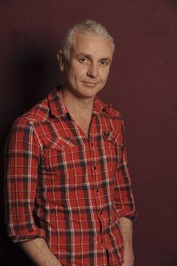
Peter Salmon
Buy books on Amazon
Peter Salmon is an Australian writer living in the UK. His biography of Jacques Derrida, An Event Perhaps, was published 2020.
He is a regular contributor to the New Humanist, and has been published in the Sydney Review of Books, the Guardian, the Tablet, Cordite and Versopolis.
His first novel, The Coffee Story (Sceptre, 2011), was a New Statesman Book of the Year.
He has written frequently for Australian TV and radio and for broadsheets including the Guardian and the Sydney Review of Books.
The Blue News, his satirical column about books and publishing, was subsequently collected and published by Melbourne University Press as Uncorrected Proof (2005).
He has received Writer’s Awards from the Arts Council of England and the Arts Council of Vic -

Johannes Kepler
Johannes Kepler (German pronunciation: [ˈkɛplɐ]) was a German mathematician, astronomer and astrologer, and key figure in the 17th century scientific revolution. He is best known for his eponymous laws of planetary motion, codified by later astronomers, based on his works Astronomia nova, Harmonices Mundi, and Epitome of Copernican Astronomy. These works also provided one of the foundations for Isaac Newton's theory of universal gravitation.
Buy books on Amazon
During his career, Kepler was a mathematics teacher at a seminary school in Graz, Austria, where he became an associate of Prince Hans Ulrich von Eggenberg. Later he became an assistant to astronomer Tycho Brahe, the imperial mathematician to Emperor Rudolf II and his two successors Matthias and Ferdinan -

Serge Lang
Serge Lang was an influential mathematician in the field of number theory. Algebra is his most famous book.
Buy books on Amazon
Librarian Note: There is more than one author in the GoodReads database with this name. See this thread for more information. -
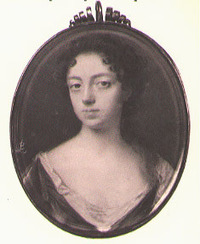
Anne Conway
Anne Conway (also known as Viscountess Conway; née Finch; 14 December 1631 – 18 February 1679) was an English philosopher whose work, in the tradition of the Cambridge Platonists, was an influence on Gottfried Leibniz.
Buy books on Amazon -

John Vianney
St. Jean-Marie Vianney was born in 1786 at Dardilly, France. After being drafted, leaving the army, and opening a school for village schoolchildren, he joined the minor seminary of Verrieres in 1812 and was ordained a priest three years afterward.
Buy books on Amazon
He is often referred to as the "Curé d'Ars". He became internationally notable for his priestly and pastoral work in his parish because of the radical spiritual transformation of the community and its surroundings due to his saintly life, mortification, his persevering ministry in the sacrament of confession, and his ardent devotion to the Blessed Virgin Mary and to Saint Philomena.
St. Vianney died at Ars-sur-Formans, France, in 1859, and was declared a saint by Pope Pius XI in 1925. His feast day -

Georg Christoph Lichtenberg
Georg Christoph Lichtenberg was a German scientist, satirist and Anglophile. As a scientist, he was the first to hold a professorship explicitly dedicated to experimental physics in Germany. Today, he is remembered for his notebooks published posthumously, which he himself called "waste books", using the English bookkeeping term, and for his discovery of the strange treelike patterns now called Lichtenberg figures.
Buy books on Amazon -

Dermot Moran
Dermot Moran is currently the inaugural holder of the Joseph Chair in Catholic Philosophy at Boston College and he also served as Chair of the Philosophy Department until June 2023. Previously, he held the full Professorship of Philosophy (Chair of Metaphysics and Logic) at University College Dublin, from 1989 to his retirement. At its General Assembly in Athens, Greece, on 9th August 2013, Professor Dermot Moran was elected President of the International Federation of Philosophical Societies/ Fédération Internationale des Sociétés de Philosophie (FISP), for a five-year period from 2013 to 2018. As President of FISP, he also presided over the 24th World Congress of Philosophy held in Beijing, China, 13-20 August 2018. He is now Past Preside
Buy books on Amazon -

Isaac Kramnick
Isaac Kramnick was an American political theorist, historian of political thought, political scientist, and the Richard J. Schwartz Professor of Government at Cornell University. He was a subject-matter expert on English and American political thought and history.
Buy books on Amazon -

Giambattista Vico
Giovanni Battista (Giambattista) Vico or Vigo was an Italian political philosopher, rhetorician, historian, and jurist. A critic of modern rationalism and apologist of classical antiquity, Vico's magnum opus is titled "Principles/Origins of [re]New[ed] Science about the Common Nature of Nations" (Principi di Scienza Nuova d'intorno alla Comune Natura delle Nazioni). The work is explicitly presented as a "Science of reasoning" (Scienza di ragionare), and includes a dialectic between axioms (authoritative maxims) and "reasonings" (ragionamenti) linking and clarifying the axioms. Vico is often claimed to have inaugurated modern philosophy of history, although the expression is alien from Vico's text (Vico speaks of a "history of philosophy nar
Buy books on Amazon -
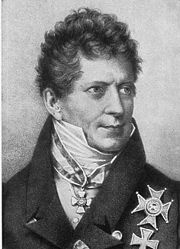
Friedrich von Gentz
Friedrich von Gentz (2 May 1764 – 9 June 1832) was a German publicist and statesman.
Buy books on Amazon
Breslau (modern Wrocław) is now in Poland, but at the time of Gentz's birth it had just been ceded by Austria to Prussia, and Gentz had familial links to Prussia. -

Galileo Galilei
Galileo Galilei was a Tuscan (Italian) physicist, mathematician, astronomer, and philosopher who played a major role in the Scientific Revolution. His achievements include improvements to the telescope and consequent astronomical observations, and support for Copernicanism. Galileo has been called the "father of modern observational astronomy", the "father of modern physics", the "father of science", and "the Father of Modern Science." The motion of uniformly accelerated objects, taught in nearly all high school and introductory college physics courses, was studied by Galileo as the subject of kinematics. His contributions to observational astronomy include the telescopic confirmation of the phases of Venus, the discovery of the four larges
Buy books on Amazon -

Walter Bagehot
British journalist Walter Bagehot edited The Economist and wrote The English Constitution (1867), an analysis of the comparative powers of the branches of government.
Buy books on Amazon
Walter Bagehot, a businessman and essayist, extensively covered literature and affairs.
https://en.wikipedia.org/wiki/Walter_... -
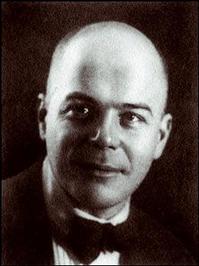
Victor Shklovsky
Viktor Borisovich Shklovsky (Russian: Виктор Борисович Шкловский) was a Soviet literary theorist, critic, writer, and pamphleteer.
Buy books on Amazon -

Horapollo
Horapollo (from Horus Apollo, Ὡραπόλλων) is supposed author of a treatise on Egyptian hieroglyphs, extant in a Greek translation by one Philippus, titled Hieroglyphica, dating to about the 5th century.
Buy books on Amazon
Horapollo is mentioned by the Suda (ω 159) as one of the last leaders of Ancient Egyptian priesthood, at a school in Menouthis, near Alexandria, during the reign of Zeno (AD 474–491). According to the Suda, Horapollo had to flee because he was accused of plotting a revolt against the Christians, and his temple to Isis and Osiris was destroyed. Horapollo was later captured and after torture converted to Christianity. Another, earlier, Horapollo alluded to by the Suda was a grammarian from Phanebytis, under Theodosius II (AD 408–450). To this Ho